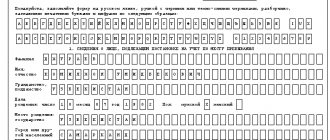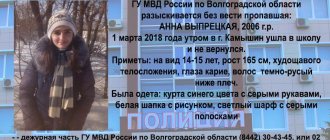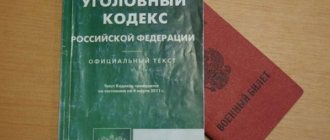Every foreign citizen who arrives in Russia must register at his place of residence or place of residence. To do this, you need to contact the migration authorities in person or through the receiving party. This procedure is not particularly difficult. In 2021, for lack of registration under Article 322.2 of the Criminal Code of the Russian Federation, criminal liability is provided.
Form notification of the arrival of a foreigner in Russia
To register, it is enough to make copies of the documents with which the foreigner arrived in the Russian Federation and send them to the Federal Migration Service along with the notification of arrival. Notification of the arrival of a foreign citizen in the Russian Federation can be downloaded here.
However, even here there are many violations, and one of them is fictitious registration of foreign citizens. The detailed text of Article 322.2 of the Criminal Code of the Russian Federation can be found here.
Amount of fine and possibility of criminal prosecution
Criminal liability for fictitious registration is established in paragraph 2 of Article 322 of the Criminal Code. This norm establishes the following types of sanctions for those responsible:
Punishment in the form of a fine, which can range from 100,000 to 500,000 rubles.
- The same article of the Criminal Code provides for the recovery from the offender of his earnings or other income for the last 3 years as punishment.
- Violators can also be sentenced to forced labor for up to three years. In addition, he may be prohibited from holding any positions or engaging in certain types of activities.
- The most severe type of punishment is imprisonment. Its maximum term can be three years.
However, this article of the Criminal Code contains a note. It states that a person can be released from prosecution if they help solve the crime. True, his actions should not contain another crime.
In what cases can a registration not be considered fictitious?
A foreign citizen arriving in Russia is registered at a specific address, but this does not mean that he must spend every day in this living space. The Constitution of the Russian Federation enshrines one of the fundamental rights – freedom of movement. That is, if, for example, a migrant came to visit relatives and went for a week or more to another city, to visit other relatives or for tourism purposes, this cannot be considered a violation of migration registration.
The same applies to legal entities that hired a migrant and provided him with living space. If during the course of work, an employee needs to leave, for example, to another site, this cannot be considered a fictitious registration.
The state must control the number of migrants and monitor their compliance with laws, including in order to ensure the security of the state. Penalties and even criminal liability for providing fictitious registration to foreigners or stateless persons are primarily a preventive measure to prevent this criminal activity, stopping the illegal “flow” of migrants into the country and punishing those who profit from it.
For help and legal advice, you can contact the Legal Agency https://migron.ru/. Phone: +7 495 118-33-74.
Get a free consultation with a migration lawyer.
Write your question in the form, and a migration law specialist will call you back and advise you. Fictitious registration - what are the dangers? / Lawyer Zavertnev.
Why are there difficulties with registration?
Registration at the place of residence can be either permanent or temporary. As a rule, foreign citizens receive registration of the second type. Its duration depends on the purposes and for how long the traveler from abroad arrived in Russia.
The minimum period for temporary registration is a month (although it happens that a guest asks to register for only a few days), and the maximum is limited to five years.
When a foreigner stays at a hotel or the inviting company handles his migration registration, problems usually do not arise. If a foreign citizen is staying with private individuals, they often refuse to register him at his place of residence.
This can be caused by various reasons. It's no secret how often real estate scams occur, and people are simply afraid: of becoming victims of fraud.
Some people simply don’t want the extra hassle, because the homeowner will have to go with the migrant to the Federal Migration Service and be present when submitting the application.
The application for a temporary residence permit can be downloaded on our website.
In such a situation, a foreign citizen begins to look for alternative options. And if there is demand, there will be supply: especially clever Russians began to offer such a service as fictitious registration of a foreign citizen. For the time being, no one thinks about punishment, however, if the deception is revealed, very severe penalties will follow.
How is migration registration carried out?
A mandatory condition for registering for migration is the presence of a receiving party. This may be an individual or legal entity. The receiving party fills out the form, provides its documents, including the right to own real estate, a passport and a foreigner’s migration card. After checking, the responsible employee puts marks in the lower, tear-off part of the application, which confirms migration registration.
The person or organization acting as the receiving party must fully understand that from the moment of registration they are responsible for compliance with the laws of Russia by the migrant, including the provisions of migration law.
Which registration is fictitious
Regular registration takes a minimum of time and poses virtually no threat to the homeowner. It consists in the fact that both the owner of the property and the foreigner must appear together at the migration authorities.
The first one must have a passport and a document confirming the right of ownership of the property. The foreigner presents an identity card and a migration card.
This is what a registration stamp looks like in the Russian Federation
The owner of the living space submits a corresponding application to the GUVM, and his guest receives a temporary registration stamp. At this point the procedure is considered complete. If it is followed correctly, a foreign citizen can apply for a labor patent. In this case, the place in which the migrant lives and his registration address must be identical.
If the owner does not want to register a new tenant, it is worth remembering that fictitious registration of a foreign citizen at the place of residence is subject to not only administrative, but also criminal liability.
In such cases, it is better not to take risks and look for other housing, the owners of which will be more accommodating.
But first you should try to convince the owner that temporarily registering another person in your living space does not threaten him with anything. At the end of its validity period, there is no need to go anywhere; the foreigner will be deregistered automatically.
By submitting an application, the owner simply notifies the migration authorities that other people are temporarily registered in his apartment.
The following cases fall under the concept of fictitious registration:
- When a person knowingly provides false information or fake documents.
- When a foreigner registered at his place of stay, the owner of the premises did not intend to provide him with his housing.
- If a migrant registered at his place of stay, although he knew that he would not live there.
For fictitious registration of foreign citizens, the fine is from 100,000 to 500,000 rubles.
Punishment for fictitious registration of foreign citizens in this case is borne by both: the migrant and the one who registered him. An official who allowed a fictitious registration will not be able to avoid it either, if it is established that this happened intentionally.
What is fictitious migration registration?
Migrants arriving in Russia in search of work often do not have relatives or friends who can act as hosts. Since a job has not yet been found, there is also no company that could officially legalize a foreigner’s stay in the country. This can often be used by enterprising people who do not fully understand what they may face by providing deliberately false data.
Fictitious migration registration is a case when the receiving party is an outsider (individual or legal entity), or even a relative who indicates in the application that the migrant will live at a specific address, but is not going to provide premises for living. Migration registration is also considered fictitious if the data provided in the application is false or if fake certificates and other documents are provided.
Penalties for fictitious registration
Despite the strict punishment, thousands of such cases are observed in Russia every year. It is reckless to hope that they won’t get caught: unlike some other government agencies, Russian migration authorities work perfectly.
Employees often conduct raids, and neighbors often report the possible presence of illegal residents.
In identifying illegal immigrants, they have the right to use a variety of measures: checking against registration databases, requesting documents on rental housing, interviewing all suspects, as well as forensic examination of documents.
All this makes it possible to identify the fictitiousness of registration, if it took place. So before you decide to take such a risky step, you need to know what the risks are.
How is the verification process carried out?
Only a judicial authority has the right to recognize a registration as fictitious. The basis for opening a case is a statement from an employee of the Migration Service or a local police commissioner. But often the initiators are vigilant neighbors. After reviewing the application, the FMS employee performs the following actions:
- checks the actual stay of the migrant at his place of registration;
- finds out how many citizens are actually registered in a residential area using the all-Russian database;
- asks neighbors about the actual residence of these citizens, checks their place of work;
- checks registration documents;
- if necessary, interviews all persons living in the premises.
If a FMS employee suspects that a foreign citizen has provided false documentation or false information during registration, then a request is sent to the internal affairs bodies of the Russian Federation to clarify and verify the authenticity of the information. Next, an investigation is carried out, and either the case is sent to court, or if there is no evidence of a crime, the investigation is terminated. This is how the migrant’s documents are checked.
How to check if the registration procedure has been followed
Despite the large number of violations, there are a lot of conscientious foreign citizens living in Russia. Often people are interested in how to check whether the registration is fictitious and whether the guest is registered at all.
The best way to avoid trouble is not to contact various fly-by-night companies that advertise on the Internet with offers to quickly obtain temporary or even permanent registration.
There are a huge number of cases where people who are already in a difficult situation have lost their last money due to such extortionists. The employer, hotel administration or owner of the accommodation where the foreign guest is staying must register.
Certificate of temporary registration
In this case, the migrant must be given a certificate of temporary registration, which specifies its validity period. If you still have doubts, you need to ask to know which department of the Main Directorate for Migration Affairs the representatives of the receiving party contacted.
Of course, officials will not provide such information over the phone, but it’s worth taking a little time and going there in person. Since many issues are now resolved through the MFC and the State Services portal, the queues at migration departments have become much shorter.
What threatens those who do not live according to registration?
Since in Russia, unlike many other countries, there is an institution of registration, the law has a negative attitude towards situations when one of the citizens does not live at the place of registration, but is, for example, in another city. However, such cases are not uncommon, and it is impossible to track them all.
Officially, a fine of 2,000 rubles is imposed for living outside your registration.
Moreover, this can be quite difficult to prove. If you don’t come into conflict with the local police officer or scandalous neighbors, you can live like this for years (meanwhile, the officially permitted period of residence without registration is limited to 3 months).
However, this causes certain inconvenience to the resident.
Without a permanent residence permit, it is difficult to get a normal job; without it, you will not be able to obtain a Taxpayer Identification Number (TIN), register an individual entrepreneur, or enroll your child in school.
In addition, if the violation is discovered, you will have to pay an administrative fine of 2,000 to 3,000 rubles. In the capital, fines will be even higher.
What threatens homeowners?
Fictitious “registration” of foreign citizens can become a source of significant problems for Russian home owners. Responsibility for this violation is more significant for them compared to a similar punishment for foreigners whom they register with them. So, if a fine of 5 thousand rubles is collected from a foreign citizen “registered” in Moscow, then the person who registered him risks paying the state 500 thousand (according to the law, the fine “fork” is 100-500 thousand rubles. )
Another method of punishment is primarily aimed at homeowners - correctional labor. They are usually assigned to property owners in the Russian Federation who have violated the law. An important question is how to renew the registration of a foreign citizen. This procedure may be necessary for foreigners who have entered the Russian Federation visa-free.
To renew registration, the receiving party (i.e., the homeowner who has “registered” a citizen of another country) is required to submit a package of documents (originals and copies) to the Department of Internal Affairs of the Ministry of Internal Affairs no later than a week before the end of the current registration. This package includes:
- petition for extension of “registration” (application),
- foreigner's migration card,
- visitor's passport,
- documents that can confirm the need for a foreign citizen’s continued stay in Russia.
According to the law, 7 days are provided for registration renewal. You must submit documents for its extension in person (as opposed to the initial submission, which can be done by mail). For late registration, the homeowner is required to pay a fine. Its size is 2-5 thousand rubles. The amount of penalties is regulated by the Code of Administrative Offenses of the Russian Federation (Article 18.8).
Features of the application of punishment
The article of the Criminal Code, which provides punishment for fictitious registration, is often used, however, imprisonment is still considered a last resort. In addition, there are no established rules regarding who should serve such a sentence - the migrant or the homeowner.
Most often, the owners have to answer, but first law enforcement agencies must prove that the person intentionally violated the law.
It should not be surprising that the Criminal Code establishes such strict standards. In the practice of law enforcement agencies, there have been many cases where migrants have committed offenses and even crimes.
If they do not live at their place of registration, their search can take a very long time. So, in many ways, strictness towards those responsible for fictitious registration is a necessary security measure.
For this reason, one should not expect a weakening of liability for such offenders. Foreign citizens in such cases face heavy fines and deportation from the country. In addition, a ban on entry into Russia may be imposed for a certain number of years.
Punishment for the owner or tenant of residential premises
The receiving party that offers its illegal services faces liability for fictitious registration of foreign citizens. Initially, owners of residential space are fined or assigned community service, that is, articles of the Code of Administrative Offenses are applied. Legal entities or ordinary citizens who have already received administrative penalties for such an act, but continue to engage in illegal activities, are brought to criminal liability. It’s a paradox, but the owner of an apartment or house where a migrant previously lived and was registered can receive punishment. This is possible if a temporarily registered tenant moves out, and the owner or tenant of the premises does not apply to the FMS to deregister him. After the expiration of the temporary registration, it is automatically canceled, and the owner, through the court, will be forced to pay a fine or be forced to perform corrective work.








